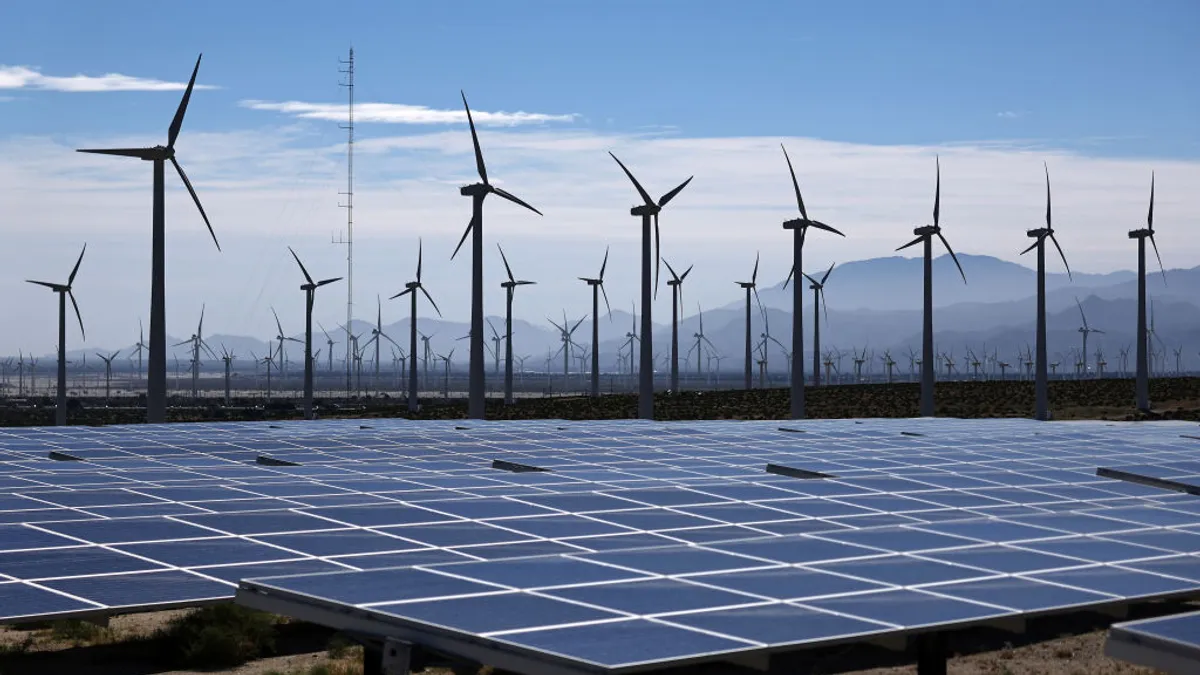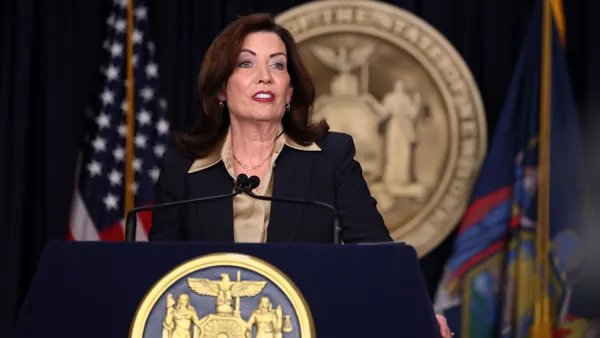Dive Brief:
-
The Federal Energy Regulatory Commission on Thursday pressed pause on its March decision that would have prevented states from refusing to accept demand response as part of distributed energy resource (DER) aggregations under its landmark Order 2222.
-
Chair Richard Glick said during the commission's open meeting that he was swayed by Commissioner Mark Christie, a former Virginia utility regulator, and other intervenors, who had argued that such a move was an overstep by FERC and a violation of states' rights. "After reflecting on the comments made at the time by my colleague, Commissioner Christie, and after reviewing the rehearing requests that were submitted, I am persuaded that we should not be putting the cart before the horse," said Glick.
-
FERC also on Thursday established a joint-federal state task force on transmission development that will address planning and cost allocation issues.
Dive Insight:
Utilities and state regulators had decried FERC's March move — Order 2222-A — echoing some of Commissioner Christie's concerns in their April comments. FERC's initial order denied states the ability to opt out of allowing demand response aggregations to bid into the wholesale market, in a move lauded by DER advocates.
Glick had initially argued that because the U.S. Court of Appeals for the D.C. Circuit ruled that FERC's energy storage-focused Order 841— similar in structure to the DER order in that both are an effort to lower barriers to those technologies' participation in the wholesale markets — was within the commission's jurisdiction, and did not encroach on state authority. But the National Association of Regulatory Utility Commissioners argued in its request for rehearing on Order 2222-A that, unlike with storage, states have a provision in place allowing them to opt out of such aggregations, Order 719.
Glick on Thursday said he was persuaded by some of the arguments filed against 2222-A, and that the commission would further evaluate whether to allow demand response participation in the context of a broader notice of inquiry (NOI) proceeding, which is considering whether to remove the demand response opt-out under 719 altogether.
"These issues are best considered holistically and … in the context of the NOI," said Glick.
Adam Benshoff, vice president of regulatory affairs for Edison Electric Institute, which also issued a request for rehearing against 2222-A, thanked the commission in an emailed statement for setting the decision aside "and for providing an opportunity for additional discussion on the critical interplay between FERC policy and the impacts it has on the distribution system."
NARUC Director of Energy Policy and Senior Counsel Jennifer Murphy said in an emailed statement they "remain opposed" to the change set in 2222-A, but "nonetheless agree that the appropriate mechanism to evaluate the need for a change of this magnitude is in the context of a proceeding such as the Commission's broader Notice of Inquiry."
The NOI proceeding is examining whether to eliminate the Order 719 opt-out altogether — the provision was established in 2008 as a way to reassure states that it wasn't trying to overstep as retail markets expanded, but some believe its use is outdated.
"I urge the commission to eliminate this outdated and anti-competitive policy, an action, I believe, is necessary to fully unleash the power of DERs and allow consumers to realize all the benefits demand response resources can provide the DER aggregations," said Commissioner Neil Chatterjee during the open meeting Thursday.
Former FERC Chair Jon Wellinghoff, who is now chief regulatory officer of DER provider Voltus, agreed with Chatterjee that the best option forward for DERs in the long-run is to eliminate the 719 provision altogether.
"Commissioner Chatterjee has it absolutely right," he said. "This will lead to a more expeditious path."
FERC also on Thursday established a first-of-its-kind state-federal task force on electric transmission to explore planning and cost issues related to power lines, including barriers to planning and efficient interconnections, opportunities for regional coordination, among other things. The task force will be made up of FERC commissioners and 10 states.
"Our partnership with FERC on this task force presents a much-needed opportunity for state and federal regulators to work collaboratively on transmission issues that affect all stakeholders," said NARUC President Paul Kjellander in a statement. "Our shared authority over how to plan and pay for transmission infrastructure and the rapid pace of the energy transition have made such collaboration an imperative for all of us."
The development of a task force follows comments from Glick that the commission will lay out its plans to develop transmission planning and cost allocation by the end of the summer. Thursday's order requests NARUC to submit state regulator nominations in the next 30 days, and the first meeting is expected to be held this fall, according to FERC.













